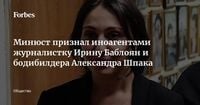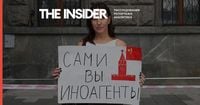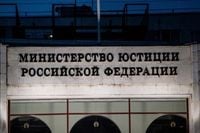The Ministry of Justice of Russia has recently updated its register of foreign agents, adding four new individuals to the list, including prominent figures from various fields. Among those designated are blogger Alexander Shpak, journalist Irina Babloyan, economic observer Vyacheslav Shiryaev, and singer Maria Chistyakova, who performs under the pseudonym ‘Mari Govori’. The ministry claims that all four have disseminated unreliable information about the actions and policies of the Russian authorities and the Armed Forces of Russia.
This update is part of an ongoing effort by the Russian government to monitor and control dissenting voices. Shpak, who gained notoriety for burning his Russian passport while playing the Ukrainian national anthem, has been particularly vocal against the government. Babloyan, a former host at the now-defunct Echo of Moscow, transitioned to YouTube after the station's closure, where she continues to engage with her audience through live broadcasts.
According to the Ministry of Justice, these individuals not only spread falsehoods regarding the military actions and political decisions of the Russian government but also participated in the creation and dissemination of materials from other foreign agents. This assertion reflects the broader narrative that the government is pushing to justify its crackdown on dissent.
In a related development, the ministry has also placed former Foreign Minister Andrei Kozyrev on the list of foreign agents. Kozyrev, who served from 1990 to 1996, is a notable figure in Russian politics and his inclusion marks a significant moment in the ongoing efforts to silence former officials critical of the current regime.
Vitaly Borodin, head of the Federal Project on Security and Combating Corruption, has suggested that foreign agents should be labeled as traitors and proposed that their passports include a corresponding mark. This proposal highlights the increasing hostility towards those labeled as foreign agents, which has become a term of derision in Russian society.
Furthermore, the Ministry of Internal Affairs has placed political scientist Ekaterina Shulman on the wanted list, adding another layer to the ongoing crackdown on dissent. Shulman, an outspoken critic of the government, has been a prominent voice in discussions about Russian politics and society, making her a target for the authorities.
The legislation regarding foreign agents was first introduced in Russia in 2012, primarily as a response to mass protests against the government. This law allowed the Ministry of Justice to designate non-profit organizations as foreign agents if they received foreign funding and engaged in political activities. Over time, the definition has expanded to include media outlets and individuals who may not receive foreign funding but are deemed to be under foreign influence.
As of now, the register contains over 900 individuals and organizations, a number that continues to grow as the government intensifies its efforts to control the narrative surrounding its actions and policies. The Ministry of Justice updates the list weekly, reflecting the ongoing nature of this campaign.
Shpak, Babloyan, Shiryaev, and Chistyakova are among the latest to face repercussions for their views. Shpak, who has already been sentenced in absentia to eight years in prison for spreading military “fakes,” is a stark example of the risks faced by those who speak out against the government. His case, along with those of the others, underscores the precarious position of dissenters in Russia today.
The Ministry of Justice has indicated that the reasons for including individuals in the foreign agents list often stem from their participation in creating and spreading materials that are critical of the Russian military and government policies. This includes criticism of the military operation in Ukraine, which the government has framed as a special military operation.
In addition to the punitive measures taken against these individuals, the Russian government has also expanded the restrictions placed on foreign agents. These restrictions include prohibiting them from holding positions in the civil service, participating in elections, and organizing public events. Recently passed laws further tighten control over foreign agents, allowing for judicial proceedings on certain criminal charges without their participation and enabling the confiscation of property for actions deemed to discredit the military.
These developments are indicative of a broader trend in which the Russian government seeks to consolidate power and suppress dissenting opinions. The designation of individuals as foreign agents serves not only to stigmatize them but also to create a chilling effect on free expression within the country.
The recent updates to the foreign agents register have sparked discussions about the implications for freedom of speech and the future of dissent in Russia. As the government continues to expand its reach and tighten its grip on society, the situation for critics and activists remains precarious.
With the legislative framework in place to control and monitor dissent, the lives of those labeled as foreign agents are increasingly complicated. They face legal challenges, social ostracism, and the constant threat of imprisonment. The Ministry of Justice’s actions reflect a broader strategy to silence opposition and maintain the status quo in the face of growing discontent.
As Russia moves forward, the implications of these actions will likely resonate beyond its borders, impacting international perceptions and relations. The struggle for freedom of expression and the right to dissent remains a critical issue as the country navigates its complex political landscape.










